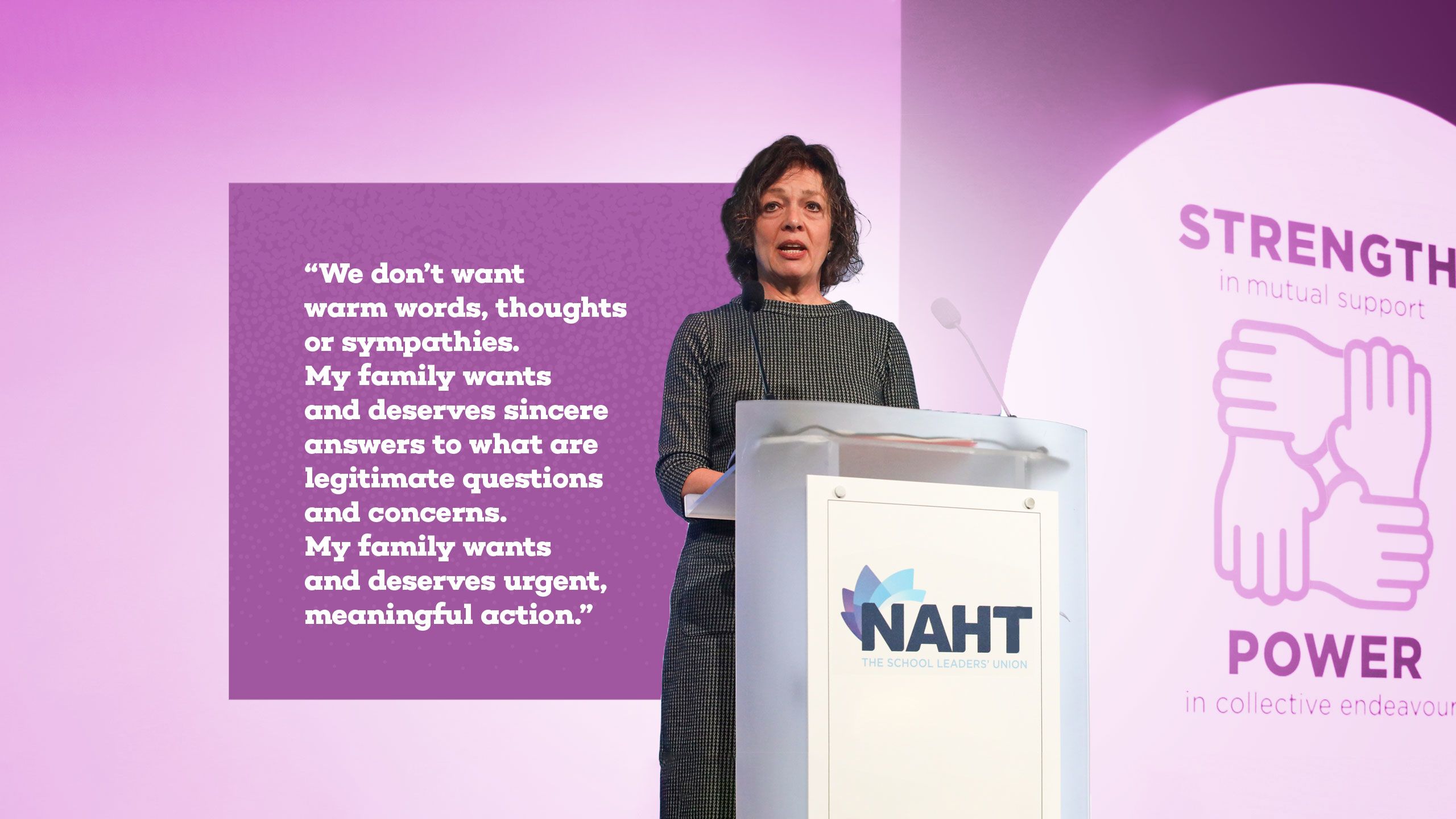
Perhaps unsurprisingly, you could hear a pin drop during Professor Julia Waters’s powerful and moving speech at NAHT’s Annual Conference in Telford in April. Professor Waters is, of course, sister to Ruth Perry, the head teacher at Caversham Primary School in Reading, Berkshire, whose death by suicide in January after Ofsted downgraded her school from ‘outstanding’ to ‘inadequate’ shocked and devastated the profession.
Moreover, her tragic loss has opened something of a floodgate, a pent-up outpouring of emotion, anger and demand for reform of what Professor Waters called the “flawed, inhumane system” that is Ofsted and England’s high-stakes school inspection and accountability model.

JAMES BOWEN
NAHT ASSISTANT GENERAL SECRETARY
As NAHT assistant general secretary James Bowen tells Leadership Focus, it is a message that has resonated deeply within the profession: “So many of our members felt quite personally affected by Ruth Perry’s story.
“There was that sense that, for year after year after year, we’ve complained about this, but the system has just carried on. Now, there is a sense that we have got to stand up and challenge things. The appetite to stand up for a fairer system is stronger than ever, and at the conference, members began to explore what that might look like.”
The tectonic plates have, perhaps, begun to shift, even just a little. When even former chief inspector of schools Sir Michael Wilshaw, arguably one of the architects of the current abrasive regime, admits, as he did in June, that he has changed his mind over the value of prescriptive one-word judgements and is now leaning towards supporting the Labour Party’s plan for a more nuanced ‘report card’ approach, it is clear there is change in the air.

PAUL WHITEMAN
NAHT GENERAL SECRETARY
However, the concessions announced so far by the government and Ofsted – including changes to inspection processes, a revised complaints procedure and new well-being investment – do not, yet, go nearly far enough, as NAHT general secretary Paul Whiteman points out.
As he said in response to the package of measures unveiled by Ofsted in June: “It has taken far too long for the government and Ofsted to announce this relatively modest set of measures, and school leaders remain immensely frustrated at the lack of urgency and ambition being shown. NAHT continues to call for more fundamental reform of the inspection process.
“While the government insists on consigning schools to simplistic single-word judgements, the system will remain fundamentally flawed and put unnecessary pressure on school leaders.”




So, what would NAHT like to see in terms of reform? And, in the meantime, what can members do – how can and should they be responding – when Ofsted’s call comes?

KATE ATKINSON
NAHT NATIONAL SECRETARY (ADVICE)
We’ll pick up on the wider reform conversation later, but in terms of practical responses members can take, the sad truth is their options are somewhat limited, points out Kate Atkinson, NAHT national secretary (advice).
In the immediate aftermath of Ruth’s death, when emotions were understandably running high, there were calls for head teachers and staff to wear black armbands when Ofsted came, with staff and head teacher Flora Cooper at John Rankin School in Newbury, Berkshire, even doing so. However, as Flora also discovered, taking unilateral action, such as barring entry to Ofsted, is not legally an option.
“The law is quite clear. You can’t bar entry to an Ofsted inspector,” Kate emphasises. “What you can do, however, is try to regain some agency and control over the process. You can, for example, decide not to advertise your Ofsted results; that is entirely within your gift as a head teacher.
“You can say you do not have faith in the Ofsted grading system and, therefore, are not prepared to put them up as advertising. That you don’t think it is the right information for parents and that you think the school is more nuanced and complex.
“Then, if Ofsted is in and you don’t like what’s happening, our advice is to raise your concerns on the day with the inspector, to speak out formally in a short letter. It is best, if you can, to try to get things changed during an inspection because, after the inspection, it is a question of challenging the report, which is very difficult.
“You only have a very short window to challenge the outcome itself. Sometimes drafts get tweaked a little bit, but they normally don’t change anything substantive. We have a specialist advice line (0300 30 30 333), and members who are going through Ofsted or have been told Ofsted is coming can ring up and talk with our expert adviser, an ex-head teacher. So, we can give members support very quickly,” she says.
NAHT has also developed a practical guide for members to help them challenge Ofsted inspections (see below for more on this).


IAN HARTWRIGHT
NAHT HEAD OF POLICY (PROFESSIONAL)
“The inspector should treat your staff respectfully and thoughtfully, as professionals,” agrees NAHT head of policy (professional) Ian Hartwright. “They shouldn’t, for example, fire questions at your teachers or leaders; they shouldn’t hold up their hand to stop your teachers or leaders from talking or say they’re not interested in the evidence your teachers or leaders are offering because they don’t have the time to review it.
“If you have a problem or complaint during an inspection, we advise members to speak to the inspector in the first instance,” he reiterates. “If that problem can’t be resolved, then set out the issues on headed notepaper, just brief bullet points saying what you feel those problems are. Ask for a meeting with the lead inspector, give them that piece of paper, and have a witness there with you who can record any comments.
“An inspection should be done with the school, not done to the school. It is also important to have a leader, or perhaps the clerk to the governors, note the final feedback to record what was said and any comments. We’re sometimes finding that areas for improvement have changed or that areas not discussed at final feedback can suddenly appear in the final report,” Ian advises.
“It is also important to emphasise that we recognise most inspectors are simply doing the best job they can, and there are good teams out there. When the report does come in, remember it is not just for a factual accuracy check. You have a tiny window of five days to make a complaint about the report. If you make that complaint, that holds the inspection report until Ofsted has handled that complaint.
“If you make a complaint, that has to be done online. The key is to be clear about the substance of your complaint. Is it, for instance, about the inspectors’ conduct, that the inspectors did not examine all the relevant evidence or perhaps that they didn’t conduct the deep dives properly?
“If you have to complain about the inspection during the inspection, please ring NAHT and log it with us. From September, it will also be possible to ring Ofsted and ask to speak to the senior inspector where you feel there have been problems with an inspection, which you can do before the report is published.
“Overall, however, I don’t think Ofsted fully grasps the level of anger many members feel. There are people within Ofsted who understand it, but corporately, I think Ofsted remains in denial,” Ian adds.
There may also be some recourse to legal avenues, albeit in very limited circumstances. In June, for example, Ofsted unusually – and possibly in a sign that it is beginning to hear the level of anger and disquiet out there – said it would re-inspect Queen Emma Primary School in Cambridge, led by head teacher Sarah Jarman, after it had threatened legal action over an ‘inadequate’ rating.

PAULA PORTER
SOLICITOR AND NAHT ASSISTANT GENERAL SECRETARY
“There does seem to have been something of a sea-change in Ofsted’s approach to litigation,” says Paula Porter, solicitor and NAHT assistant general secretary. “There have already been a couple of successful cases, including the one in Cambridge. We are seeing Ofsted stepping back where normally, previously, it wouldn’t have made any concessions whatsoever.
“Ofsted is also now taking more heed of the complaints process; we are seeing more concessions in relation to process and a somewhat greater willingness to engage and learn from complaints, although that does not appear to be consistent across all of Ofsted’s regions. But be aware, it is still not easy. A school has to pay for any representation, and it can be a very expensive process. So, it is not something you go into lightly, and you need proper professional advice before embarking on that course of action,” Paula adds.




IAN HARTWRIGHT
NAHT HEAD OF POLICY (PROFESSIONAL)
“The inspector should treat your staff respectfully and thoughtfully, as professionals,” agrees NAHT head of policy (professional) Ian Hartwright. “They shouldn’t, for example, fire questions at your teachers or leaders; they shouldn’t hold up their hand to stop your teachers or leaders from talking or say they’re not interested in the evidence your teachers or leaders are offering because they don’t have the time to review it.

“If you have a problem or complaint during an inspection, we advise members to speak to the inspector in the first instance,” he reiterates. “If that problem can’t be resolved, then set out the issues on headed notepaper, just brief bullet points saying what you feel those problems are. Ask for a meeting with the lead inspector, give them that piece of paper, and have a witness there with you who can record any comments.
“An inspection should be done with the school, not done to the school. It is also important to have a leader, or perhaps the clerk to the governors, note the final feedback to record what was said and any comments. We’re sometimes finding that areas for improvement have changed or that areas not discussed at final feedback can suddenly appear in the final report,” Ian advises.
“It is also important to emphasise that we recognise most inspectors are simply doing the best job they can, and there are good teams out there. When the report does come in, remember it is not just for a factual accuracy check. You have a tiny window of five days to make a complaint about the report. If you make that complaint, that holds the inspection report until Ofsted has handled that complaint.
“If you make a complaint, that has to be done online. The key is to be clear about the substance of your complaint. Is it, for instance, about the inspectors’ conduct, that the inspectors did not examine all the relevant evidence or perhaps that they didn’t conduct the deep dives properly?
“If you have to complain about the inspection during the inspection, please ring NAHT and log it with us. From September, it will also be possible to ring Ofsted and ask to speak to the senior inspector where you feel there have been problems with an inspection, which you can do before the report is published.
“Overall, however, I don’t think Ofsted fully grasps the level of anger many members feel. There are people within Ofsted who understand it, but corporately, I think Ofsted remains in denial,” Ian adds.
There may also be some recourse to legal avenues, albeit in very limited circumstances. In June, for example, Ofsted unusually – and possibly in a sign that it is beginning to hear the level of anger and disquiet out there – said it would re-inspect Queen Emma Primary School in Cambridge, led by head teacher Sarah Jarman, after it had threatened legal action over an ‘inadequate’ rating.

PAULA PORTER
SOLICITOR AND NAHT ASSISTANT GENERAL SECRETARY
“There does seem to have been something of a sea-change in Ofsted’s approach to litigation,” says Paula Porter, solicitor and NAHT assistant general secretary. “There have already been a couple of successful cases, including the one in Cambridge. We are seeing Ofsted stepping back where normally, previously, it wouldn’t have made any concessions whatsoever.

“Ofsted is also now taking more heed of the complaints process; we are seeing more concessions in relation to process and a somewhat greater willingness to engage and learn from complaints, although that does not appear to be consistent across all of Ofsted’s regions. But be aware, it is still not easy. A school has to pay for any representation, and it can be a very expensive process. So, it is not something you go into lightly, and you need proper professional advice before embarking on that course of action,” Paula adds.




What, then, is NAHT looking for in terms of wider reform and change?
James Bowen highlights that NAHT’s conversation around reform goes back many years, not least to its 2018 Accountability Commission proposals and beyond. “Our members’ frustration, disquiet and, at times, anger towards Ofsted have been a long time in the making; this is not something that has developed in the last year or so,” he points out.
“It is important to stress that this has been building up over the years if not decades. And NAHT, actually, has been at the forefront over many years of calling for a better approach to Ofsted,” he adds.
Although, clearly, the government and the inspectorate are beginning to recognise the scale of the momentum building for change, James argues that NAHT would like to see them go much further and commit to significant and meaningful reform of how inspection in England works.
“So, things like stop using that terrible word ‘inadequate’ to describe schools and their staff. It is terrible language and a terrible way to describe a group of people,” says James. “We could find new language straight away. We could also find ways to start depersonalising Ofsted reports. At the moment, the head teacher is so central to those Ofsted reports; it can feel very personal,” he adds.



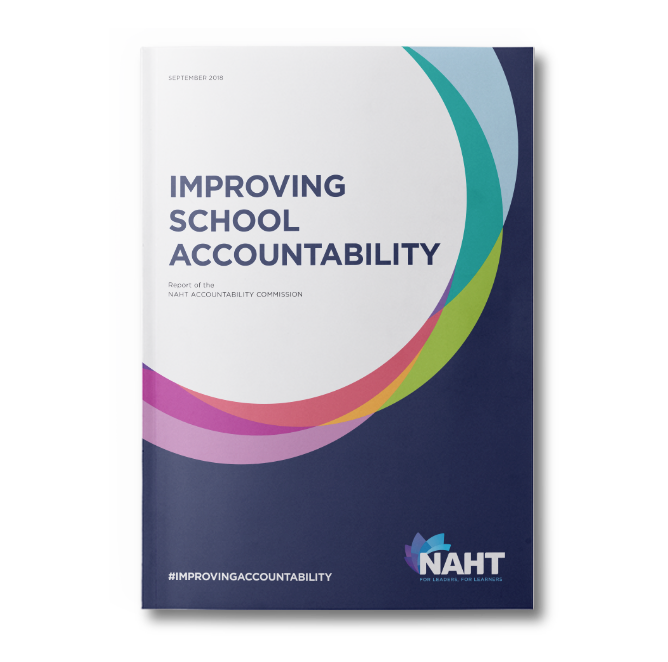
James Bowen highlights that NAHT’s conversation around reform goes back many years, not least to its 2018 Accountability Commission proposals and beyond. “Our members’ frustration, disquiet and, at times, anger towards Ofsted have been a long time in the making; this is not something that has developed in the last year or so,” he points out.
“It is important to stress that this has been building up over the years if not decades. And NAHT, actually, has been at the forefront over many years of calling for a better approach to Ofsted,” he adds.
Although, clearly, the government and the inspectorate are beginning to recognise the scale of the momentum building for change, James argues that NAHT would like to see them go much further and commit to significant and meaningful reform of how inspection in England works.
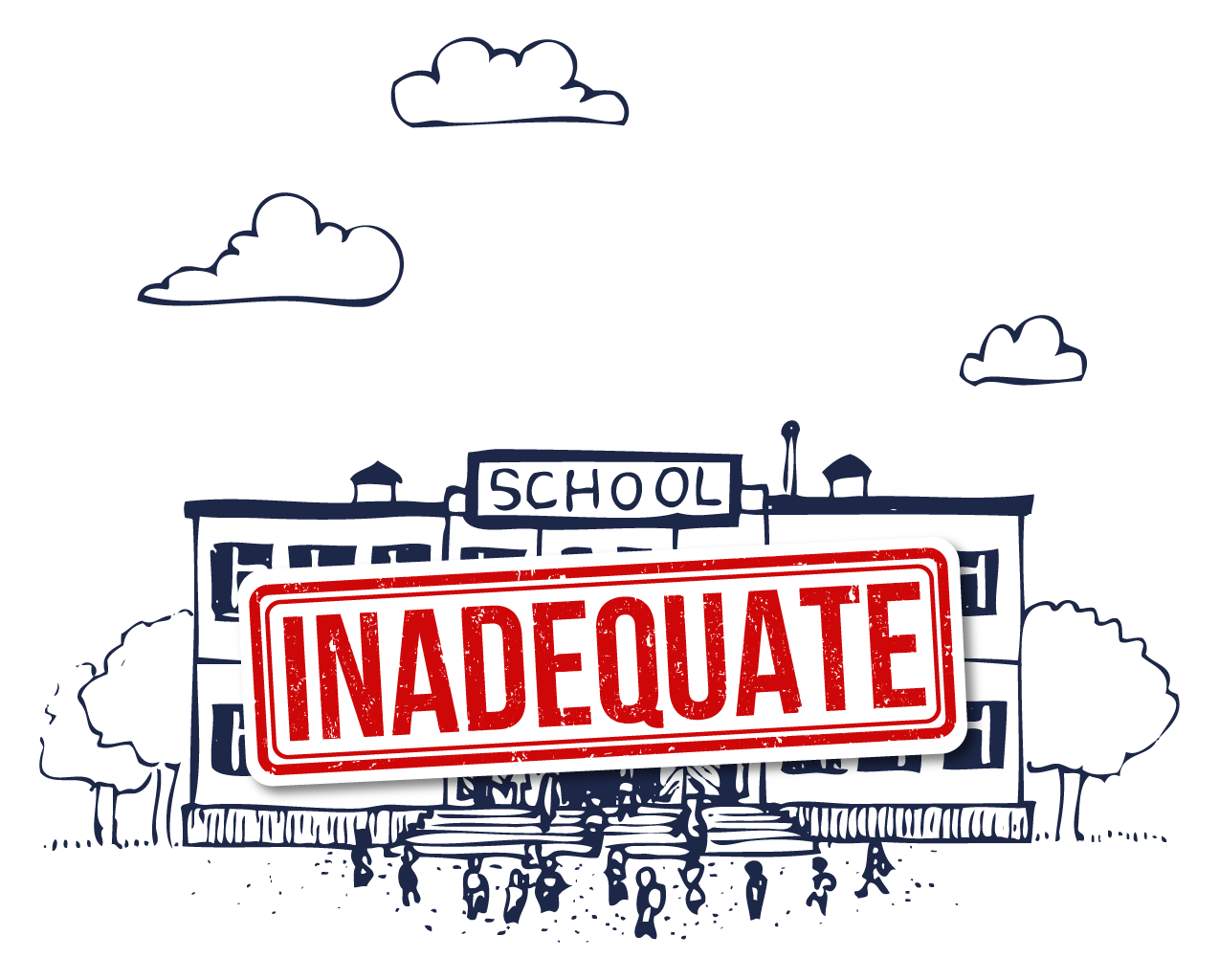
“So, things like stop using that terrible word ‘inadequate’ to describe schools and their staff. It is terrible language and a terrible way to describe a group of people,” says James. “We could find new language straight away. We could also find ways to start depersonalising Ofsted reports. At the moment, the head teacher is so central to those Ofsted reports; it can feel very personal,” he adds.
Picking up on Labour’s report card proposals, NAHT would like to see the scrapping of the over-arching, one-word grades. “For me, and probably for a lot of our members, I think that is possibly the single most important change we’d like to see. It can’t happen in isolation, but this idea that you can summarise something as complex and multifaceted as a school in one or two words is nonsense,” James says.
“Moving to a more intelligent approach, where you give parents a range of information and stop trying to simplify schools into single words, would be a huge step in the right direction,” he adds.
Of course, we need to be careful of the unintended consequences of such a major policy shift. Done well, a report-card style approach could be much better, but it will need to be carefully and thoughtfully designed so that we don’t see a continuation of the problems at the heart of the current system. Realistically, of course, that sort of substantive change would require a framework change. Therefore, it is probably more likely to be implemented by a new political administration and chief inspector.

However, given the fact that we’re (probably) looking at a general election next spring or autumn and that current chief inspector Amanda Spielman’s (pictured at NAHT’s 2019 Annual Conference) term of office comes to an end at the end of this year, a window for this sort of wholesale reform is potentially not that far off.
“Importantly, the latest offer from the government [which members are considering at the time of this edition going to press] includes a commitment that the new chief inspector will sit down and discuss these issues with NAHT. A new chief inspector does provide a new opportunity,” James says.
“The signal, ‘we’re going to scrap it, and we’re going to work with the sector and other interested stakeholders to design a new system’, from Ofsted or a new government would be very powerful,” he adds.
For the longer term, James argues, what’s needed is a willingness by Ofsted and the Department for Education to become less parochial. What works elsewhere? How do other countries do this? How can inspection – which nobody disputes is needed in principle – become less punitive and more genuinely about improvement and working with (while also challenging where appropriate) school leaders?
“What is the alternative vision? I think it is about learning from what other countries do well and effectively, and thinking deeply about what an alternative system might look like,” James says.
“There is a reality here, which is that most governments of whatever colour will expect there to be some form of school inspection taking place, to have some system where people are coming in and looking at the quality of education.
“We don’t stand against the need for accountability, absolutely not. We just want a more humane, sensible, proportionate approach. At the moment, there is a strong sense in many schools that inspection is just a bar to be jumped and not something particularly useful in terms of taking them forward. So, I think there is that long-term, big-picture thinking to be done,” he adds.



Picking up on Labour’s report card proposals, NAHT would like to see the scrapping of the over-arching, one-word grades. “For me, and probably for a lot of our members, I think that is possibly the single most important change we’d like to see. It can’t happen in isolation, but this idea that you can summarise something as complex and multifaceted as a school in one or two words is nonsense,” James says.
“Moving to a more intelligent approach, where you give parents a range of information and stop trying to simplify schools into single words, would be a huge step in the right direction,” he adds.
Of course, we need to be careful of the unintended consequences of such a major policy shift. Done well, a report-card style approach could be much better, but it will need to be carefully and thoughtfully designed so that we don’t see a continuation of the problems at the heart of the current system. Realistically, of course, that sort of substantive change would require a framework change. Therefore, it is probably more likely to be implemented by a new political administration and chief inspector.

However, given the fact that we’re (probably) looking at a general election next spring or autumn and that current chief inspector Amanda Spielman’s (pictured at NAHT’s 2019 Annual Conference) term of office comes to an end at the end of this year, a window for this sort of wholesale reform is potentially not that far off.
“Importantly, the latest offer from the government [which members are considering at the time of this edition going to press] includes a commitment that the new chief inspector will sit down and discuss these issues with NAHT. A new chief inspector does provide a new opportunity,” James says.
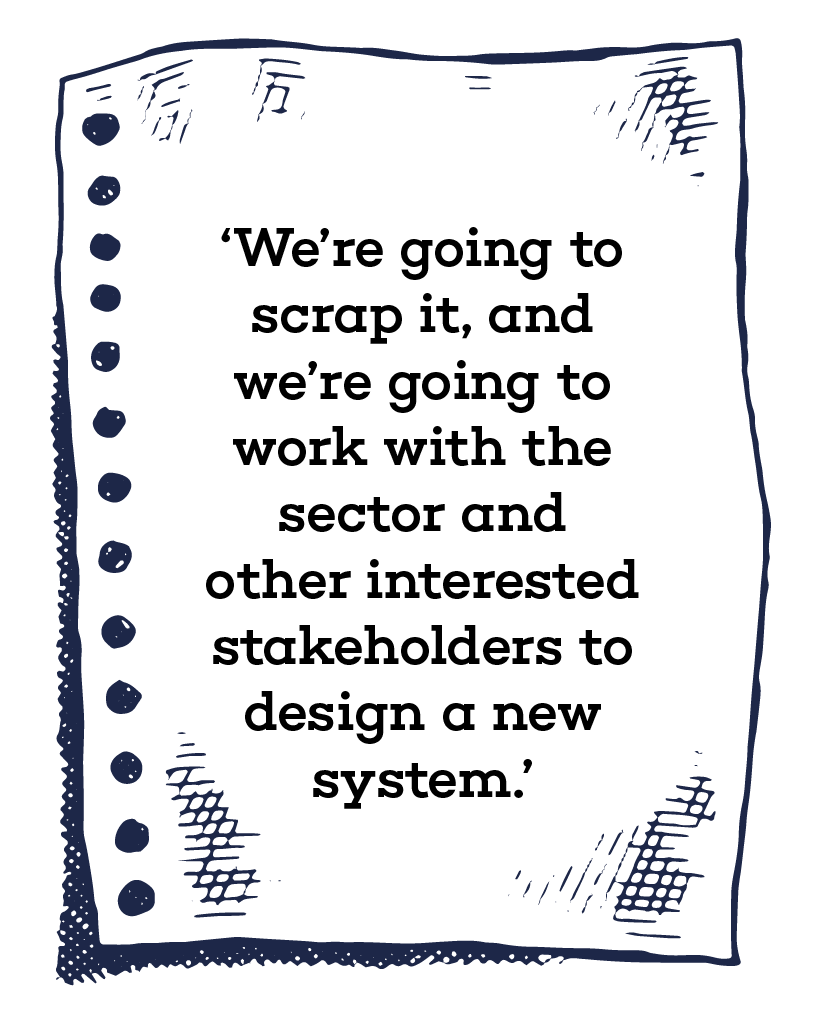
“The signal, ‘we’re going to scrap it, and we’re going to work with the sector and other interested stakeholders to design a new system’, from Ofsted or a new government would be very powerful,” he adds.
For the longer term, James argues, what’s needed is a willingness by Ofsted and the Department for Education to become less parochial. What works elsewhere? How do other countries do this? How can inspection – which nobody disputes is needed in principle – become less punitive and more genuinely about improvement and working with (while also challenging where appropriate) school leaders?
“What is the alternative vision? I think it is about learning from what other countries do well and effectively, and thinking deeply about what an alternative system might look like,” James says.
“There is a reality here, which is that most governments of whatever colour will expect there to be some form of school inspection taking place, to have some system where people are coming in and looking at the quality of education.

“We don’t stand against the need for accountability, absolutely not. We just want a more humane, sensible, proportionate approach. At the moment, there is a strong sense in many schools that inspection is just a bar to be jumped and not something particularly useful in terms of taking them forward. So, I think there is that long-term, big-picture thinking to be done,” he adds.

SIMON KIDWELL
NAHT PRESIDENT-ELECT AND HEAD TEACHER AT HARTFORD MANOR PRIMARY SCHOOL AND NURSERY
“I do think we need to give Ofsted less agency because we can’t give too much weight to individuals who visit our schools perhaps every five years,” agrees Simon Kidwell, NAHT president-elect and head teacher at Hartford Manor Primary School and Nursery in Hartford, Cheshire.
“Ofsted visited my school a few weeks ago, and it went well, but nobody can go in and judge excellence in the system in a couple of days. Also, putting schools on to a single grade is impossible when you've got a complex organisation like a school. So those things need to change.
“So, my call to members, and I spoke about this at Annual Conference in Telford, is to remove those Ofsted banners, to get rid of those quotes on the website. When you get that Ofsted report, say to parents, ‘This is just a snapshot judgement’,” he adds.
“The bottom line is, can our education system actually afford to have Ofsted inspecting in the way it currently does? Doing as much damage as it is doing?” questions Ian Hartwright.
“Because we don’t have any people to replace the teachers leaving as a result of the high-stakes accountability. Teaching is not looking attractive enough to the high-calibre people we want to attract, and the current inspection regime is not helping. We need to step back and rethink the whole system – what Ofsted needs to be for and how it works. If inspection can’t deliver consistency, it shouldn’t deliver high-stakes grades,” he adds.
“This has been a very long time coming,” emphasises Paul Whiteman in conclusion. “We’ve tried to campaign with the government and Ofsted to change things, but they never have. They won’t accept the psychological impact of inspection on our members. And the tragedy of Ruth Perry has pulled that into sharp relief.
“When you’re in the inspection window, every Sunday night, you sit there as a school leader thinking, ‘I might get the call tomorrow’. So, your weekend’s rest is disturbed before it’s over. You then spend the whole of Monday, the whole of Tuesday and half of Wednesday with the same worry. And if the phone doesn’t ring to say Ofsted is coming the next day, you have two days when you can finally get on worry-free.
“And that repeats and repeats every weekend and every week. That’s kind of like psychological torture, really. If you do that over a period of time, that has to erode your resilience; it has to have a psychological impact. That is just not good for you.
“Then, on top of that, there is the intensity of inspection when it does happen. It is very damaging to all who take part, including often the inspectors, actually. And with a very public outcome where our members can find themselves being ‘named and shamed’ in public. So, we’ve got this toxic mix, which has gone on for far too long.
“The longer this takes to solve, the longer people in the system will still be suffering. God forbid we have another suicide while trying to sort this out, trying to get Ofsted and the government to change,” Paul adds.





SIMON KIDWELL
NAHT PRESIDENT-ELECT AND HEAD TEACHER AT HARTFORD MANOR PRIMARY SCHOOL AND NURSERY
“I do think we need to give Ofsted less agency because we can’t give too much weight to individuals who visit our schools perhaps every five years,” agrees Simon Kidwell, NAHT president-elect and head teacher at Hartford Manor Primary School and Nursery in Hartford, Cheshire.

“Ofsted visited my school a few weeks ago, and it went well, but nobody can go in and judge excellence in the system in a couple of days. Also, putting schools on to a single grade is impossible when you've got a complex organisation like a school. So those things need to change.
“So, my call to members, and I spoke about this at Annual Conference in Telford, is to remove those Ofsted banners, to get rid of those quotes on the website. When you get that Ofsted report, say to parents, ‘This is just a snapshot judgement’,” he adds.
“The bottom line is, can our education system actually afford to have Ofsted inspecting in the way it currently does? Doing as much damage as it is doing?” questions Ian Hartwright.
“Because we don’t have any people to replace the teachers leaving as a result of the high-stakes accountability. Teaching is not looking attractive enough to the high-calibre people we want to attract, and the current inspection regime is not helping. We need to step back and rethink the whole system – what Ofsted needs to be for and how it works. If inspection can’t deliver consistency, it shouldn’t deliver high-stakes grades,” he adds.

“This has been a very long time coming,” emphasises Paul Whiteman in conclusion. “We’ve tried to campaign with the government and Ofsted to change things, but they never have. They won’t accept the psychological impact of inspection on our members. And the tragedy of Ruth Perry has pulled that into sharp relief.
“When you’re in the inspection window, every Sunday night, you sit there as a school leader thinking, ‘I might get the call tomorrow’. So, your weekend’s rest is disturbed before it’s over. You then spend the whole of Monday, the whole of Tuesday and half of Wednesday with the same worry. And if the phone doesn’t ring to say Ofsted is coming the next day, you have two days when you can finally get on worry-free.
“And that repeats and repeats every weekend and every week. That’s kind of like psychological torture, really. If you do that over a period of time, that has to erode your resilience; it has to have a psychological impact. That is just not good for you.
“Then, on top of that, there is the intensity of inspection when it does happen. It is very damaging to all who take part, including often the inspectors, actually. And with a very public outcome where our members can find themselves being ‘named and shamed’ in public. So, we’ve got this toxic mix, which has gone on for far too long.
“The longer this takes to solve, the longer people in the system will still be suffering. God forbid we have another suicide while trying to sort this out, trying to get Ofsted and the government to change,” Paul adds.


NAHT’s guide, Challenging Ofsted inspections, published in February last year with law firm Browne Jacobson, outlines what schools can do – and how they can respond – in the event of a drastic grade change.
In general terms, the guide emphasises that schools should approach an inspection with a view to purposefully building a relationship with the lead inspector; this is usually partly established by the initial phone call.
Head teachers should give some thought to how they want to position their school, what their narrative will be and how to support staff to show the school in the best light. The role of governors also remains important in this context.
They should also review the school’s website because it will probably be the first piece of evidence the inspector considers. It is, therefore, critical that it complies with current regulations and policy and that there is accessible information about the school’s curriculum, including subjects, sequencing of knowledge, learning and assessment.

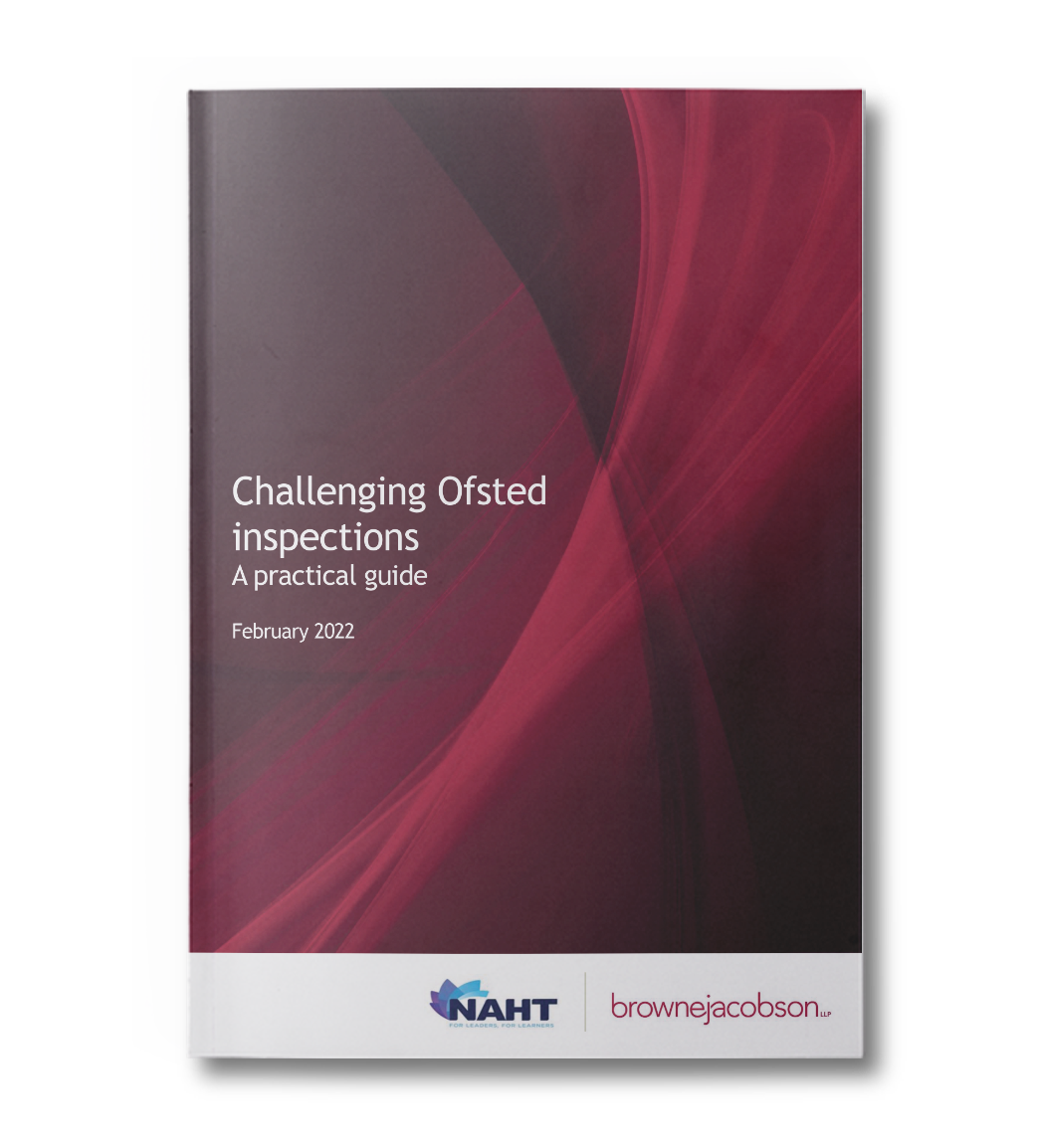
NAHT’s guide, Challenging Ofsted inspections, published in February last year with law firm Browne Jacobson, outlines what schools can do – and how they can respond – in the event of a drastic grade change.
In general terms, the guide emphasises that schools should approach an inspection with a view to purposefully building a relationship with the lead inspector; this is usually partly established by the initial phone call.
Head teachers should give some thought to how they want to position their school, what their narrative will be and how to support staff to show the school in the best light. The role of governors also remains important in this context.
They should also review the school’s website because it will probably be the first piece of evidence the inspector considers. It is, therefore, critical that it complies with current regulations and policy and that there is accessible information about the school’s curriculum, including subjects, sequencing of knowledge, learning and assessment.
The guide also makes it clear that, while not impossible, securing an injunction to prevent the publication of a report is difficult.
“Ofsted has a statutory duty to publish inspection reports, and there is also a public interest in their publication. As such, a judge will expect compelling reasons to be provided as part of any such case, as well as evidence of irreparable damage to the school if the report were to be published,” it advises.
However, it is self-evidently sensible to exhaust Ofsted’s complaints procedure as far as possible before resorting to formal legal action; this is both from a cost perspective and because the court will have expected you to do so.
“Successful judicial review cases against Ofsted are quite rare and particularly challenging where a school is looking to challenge the merit of a judgement alone,” the guide states.
“However, there have been cases where Ofsted’s decision-making and/or process has been flawed, including those that have not ended up in court, as Ofsted has been prepared to acknowledge the errors and re-inspect accordingly.
“As such, while a school’s comments on a draft report or formal complaint are not legal documents, there is value in seeking legal advice at these stages to focus the approach and understand prospects.
“Many schools also welcome the objectivity of a third-party adviser given the inevitable personal impact that an unfair Ofsted inspection can cause,” the guide adds.
You can read the full guide online here.



The guide also makes it clear that, while not impossible, securing an injunction to prevent the publication of a report is difficult.
“Ofsted has a statutory duty to publish inspection reports, and there is also a public interest in their publication. As such, a judge will expect compelling reasons to be provided as part of any such case, as well as evidence of irreparable damage to the school if the report were to be published,” it advises.
However, it is self-evidently sensible to exhaust Ofsted’s complaints procedure as far as possible before resorting to formal legal action; this is both from a cost perspective and because the court will have expected you to do so.
“Successful judicial review cases against Ofsted are quite rare and particularly challenging where a school is looking to challenge the merit of a judgement alone,” the guide states.
“However, there have been cases where Ofsted’s decision-making and/or process has been flawed, including those that have not ended up in court, as Ofsted has been prepared to acknowledge the errors and re-inspect accordingly.
“As such, while a school’s comments on a draft report or formal complaint are not legal documents, there is value in seeking legal advice at these stages to focus the approach and understand prospects.
“Many schools also welcome the objectivity of a third-party adviser given the inevitable personal impact that an unfair Ofsted inspection can cause,” the guide adds.
You can read the full guide online here.




Ofsted’s consultation on its proposed changes to post-inspection arrangements and complaints handling opened in June and will close on 15 September 2023.

According to Katie Michelon of the law firm Browne Jacobson, the proposals are a step in the right direction and show Ofsted is now listening, but they still, pardon the pun, “require improvement”.
For example, Ofsted could still be doing more in terms of engaging and properly explaining concerns about its reasoning behind judgements where a school remains unhappy post-inspection.
“The tendency for Ofsted’s formal complaint responses to answer complaints with a circular, opaque and generic reference to ‘the evidence base’ under the current system has become notorious.
“Equally, the practice of lumping together elements of a school’s complaint so that key concerns and questions are not actually responded to in the complaint response letter adds to the sense of unfairness,” she pointed out in a recent blog post.
Ofsted could also be doing more to think through how conduct issues can be meaningfully addressed and resolved for providers, she argues.
More work, too, could be done around timeframes and the human experience of inspection. The consultation’s ICASO proposals are positive in terms of offering some immediate post-inspection contact with someone from outside the inspection team, allowing the school’s position to be heard ahead of the draft report.
“In addition, the compromised situation of the lead inspector being expected to review and respond objectively to concerns that extend beyond points of clarity or factual accuracy is removed, because this would now be dealt with as a formal complaint. The formal complaint itself, however, will still be dealt with by someone within Ofsted and presumably, in many cases, still someone from the same region,” Katie argues.
However, she adds: “It must be remembered that ICASO has no power to overturn inspection judgements or decisions made by Ofsted. It is there to offer an independent view on complaints and provide recommendations, advice and guidance to Ofsted, but Ofsted does not have to comply with its recommendations.
“The toothless nature of this stage may, therefore, offer limited reassurance to providers, and they may still find it necessary to resort to legal action to at least have the prospect of a meaningful and effective remedy.”


According to Katie Michelon of the law firm Browne Jacobson, the proposals are a step in the right direction and show Ofsted is now listening, but they still, pardon the pun, “require improvement”.
For example, Ofsted could still be doing more in terms of engaging and properly explaining concerns about its reasoning behind judgements where a school remains unhappy post-inspection.
“The tendency for Ofsted’s formal complaint responses to answer complaints with a circular, opaque and generic reference to ‘the evidence base’ under the current system has become notorious.
“Equally, the practice of lumping together elements of a school’s complaint so that key concerns and questions are not actually responded to in the complaint response letter adds to the sense of unfairness,” she pointed out in a recent blog post.
Ofsted could also be doing more to think through how conduct issues can be meaningfully addressed and resolved for providers, she argues.
More work, too, could be done around timeframes and the human experience of inspection. The consultation’s ICASO proposals are positive in terms of offering some immediate post-inspection contact with someone from outside the inspection team, allowing the school’s position to be heard ahead of the draft report.
“In addition, the compromised situation of the lead inspector being expected to review and respond objectively to concerns that extend beyond points of clarity or factual accuracy is removed, because this would now be dealt with as a formal complaint. The formal complaint itself, however, will still be dealt with by someone within Ofsted and presumably, in many cases, still someone from the same region,” Katie argues.
However, she adds: “It must be remembered that ICASO has no power to overturn inspection judgements or decisions made by Ofsted. It is there to offer an independent view on complaints and provide recommendations, advice and guidance to Ofsted, but Ofsted does not have to comply with its recommendations.
“The toothless nature of this stage may, therefore, offer limited reassurance to providers, and they may still find it necessary to resort to legal action to at least have the prospect of a meaningful and effective remedy.”


